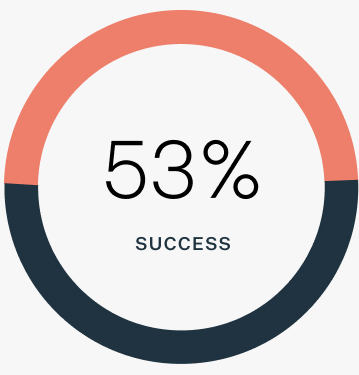Most same sex couples and single men need to use an egg donor for in vitro fertilization (IVF) and then a surrogate to carry the baby until it’s born. Whatever your situation, choosing to use donated eggs to achieve a pregnancy is a big decision that requires consideration and planning. We’re here to help.
Success Rates
We manage the egg donation process from start to finish to ensure the highest quality of eggs. As a result of our consistent and reliable approach, over 150 healthy babies have been born through frozen eggs. Our success rates show you our focused approach really works.

Egg thawing survival rate

Fertilization rate

clinical pregnancy rate per embryo transfer
How does it work?
The Surrogacy Process
Our friendly team will help answer initial questions and book a consultation with one of our fertility consultants, who will review your medical history, along with any treatment or investigations you’ve already had elsewhere, and recommend the best course of treatment for you. You can expect to have a scan and some blood tests, and an analysis of a semen sample if a male partner is involved.
Our dedicated egg donation coordinator will meet with you to discuss the programme and any tests needed. They will also introduce you to our online donor database and personalised matching service.
Once a donor is chosen and agreed, you’ll see your doctor to discuss your personal treatment plan. Then you’ll have a consultation with our senior nurse experienced in surrogacy. She will arrange for your pre-treatment screening tests and all necessary consents so that your surrogate can start her treatment.
If your surrogate is married, she and her husband will be the legal parent of the child until you and your partner apply for parental order. If your surrogate is single and you are using your own sperm, you and your surrogate will be the legal parents until you transfer the legal parentage via parental order.
Your surrogate will need hormone treatment for about 17 - 18 days before transfer to prepare her womb for embryo implantation. Our specialists will monitor her closely with ultrasound scans throughout.
Donor eggs are fertilised in our lab with sperm from you, your partner or a sperm donor. Fertilised eggs are usually cultured as embryos for five to six days, until they reach the blastocyst stage.
You’ll be updated by our senior embryologist on the progress of fertilisation, and will book a date & time for embryo transfer. The best embryo will be transferred under ultrasound guidance into your surrogate’s womb by our fertility consultants using a catheter, which is a simple and painless process without need for anaesthetic.
Most women only have one embryo transferred to avoid the risks of multiple pregnancy. Remaining embryos can be frozen and stored for future use, if another cycle is needed or for sibling pregnancy.
After the embryo transfer, you will be given a date for a pregnancy test and details of medication that should continue to be taken – with a positive test this will be up to 12 weeks of pregnancy.
We also offer an early pregnancy scan 3- 4 weeks after the pregnancy test to check for fetal heartbeat.
Find Your Donor
We can help you find your perfect match from our large choice of UK-recruited egg donors. Our smart, altruistic donors come from a diverse range of backgrounds.
SURROGATE
Patient Stories
Future Events
Get Started
You set the pace. We’re here for you when you’re ready to start.

